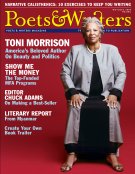The brief, contentious, and ultimately fruitless relationship between poet Stacey Lynn Brown and the editors of Cider Press, the nine-year-old independent publisher based in Halifax, Pennsylvania, that publishes Cider Press Review and sponsors the annual Cider Press Review Book Award, points to an essential question that pops up often in literary publishing: Whose opinion—author's or publisher's—should matter most when it comes to finalizing the product that enters the marketplace as a book?
Who should have final approval over a book's content and design—the author, who is the ultimate authority on the text, or the publisher, who knows how best to present that text to readers?
In this case, Cradle Song, which was chosen by final judge Tony Hoagland as winner of the press's 2007 award, didn't make it to the marketplace because the relationship between poet and publisher, marred by multiple miscommunications stemming from disputes primarily about the book's design—an area that coeditors Caron Andregg and Robert Wynne both assert is the purview of the press, not the poet—ended in late July when Cider Press revoked the award and asked Brown to return the prize money. Brown retained a lawyer who threatened litigation; both parties subsequently signed a release that allowed Brown to keep the money and recover the rights to her book.
The events leading to such an ignoble end to what is typically an exciting period in a writer's life are fresh grist for the ongoing debate about what should happen after a book is accepted for publication: Who should have final approval over a book's content and design—the author, who is the ultimate authority on the text, or the publisher, who knows how best to present that text to readers? The question takes on added significance in the small press arena, where contracts are often less formal than those used in commercial publishing. It is further complicated by a contest model that leads many authors to assume that when their book wins an award, the judge has deemed it perfect, and it will therefore be published as is. Most publishers, however, see it as their role and prerogative to edit the manuscript—whether it has won a contest or not—and certainly to decide how the book appears. In fact, unless a contract specifically states otherwise, the final decisions on both editing and design almost always reside with the press. Of course, how a publisher negotiates these potentially delicate decisions with the author varies.
Shortly after receiving the news that Cradle Song had won the award, which is given for an unpublished manuscript of forty-eight to eighty pages and requires a twenty-five-dollar entry fee, Brown, who lives in Edwardsville, Illinois, signed a contract stating that Cider Press would publish the book in 2009 and give the poet a one-thousand-dollar cash prize in lieu of royalties. Brown was required to, among other things, deliver the text of the book, an author photo, an author bio, and back-cover blurbs, as well as "contact Cider Press Review editors with any questions." In hindsight, Andregg admits the agreement is "not the best-written contract in the world." Coeditor Wynne agrees, saying, "As a two-person operation we don't have a lot of money or time to spend on working through long-winded documents, so we had something brief that we thought would suffice."
According to the contract, Cider Press agreed to "design both cover and book" and asserted that "all final editorial decisions remain the prerogative of the publishers." In addition, the editors asked Brown to approve the proof of the typeset manuscript; Brown did not comply because she says she was asked to sign off on pages with errors that had not yet been corrected. Wynne says the approval process was something they instituted after a dispute with Anne Caston, winner of the 2006 Cider Press Review Book Award, who took legal action against the press after the publication of her collection Judah's Lion. (Caston negotiated a settlement that includes a disclosure agreement stating neither she nor the editors may discuss the terms of the settlement or the events leading up to it. "I do not wish the press nor its editors any ill will as a result of that situation," Caston wrote in an e-mail. "It was never my intention—and still isn't—to cause public harm or embarrassment to a small press.")
Midway through the production process of Brown's book—after a few months in which both parties were cordially ironing out details such as using a painting the author chose for the cover (she offered to pay half of the four-hundred-dollar licensing fee) and the addition of an out-of-print clause that was not in the original contract—there arose fundamental differences in each party's understanding of its responsibilities. Andregg says she explained to Brown early on that the author's primary role was "basically to ensure the integrity of the manuscript, making sure [it] gets translated into the book properly," while the purview of the editors was "the book as a physical object—the cover and the layout and the editorial decisions that go with that." In a March 2 e-mail to Andregg regarding the licensing fee, Brown seemed to agree, writing, "As far as I'm concerned, we're in this together, and I, too, have some responsibility in terms of making the book into what I want it to be. (Not final editorial say, mind you. Just responsibility.)"









